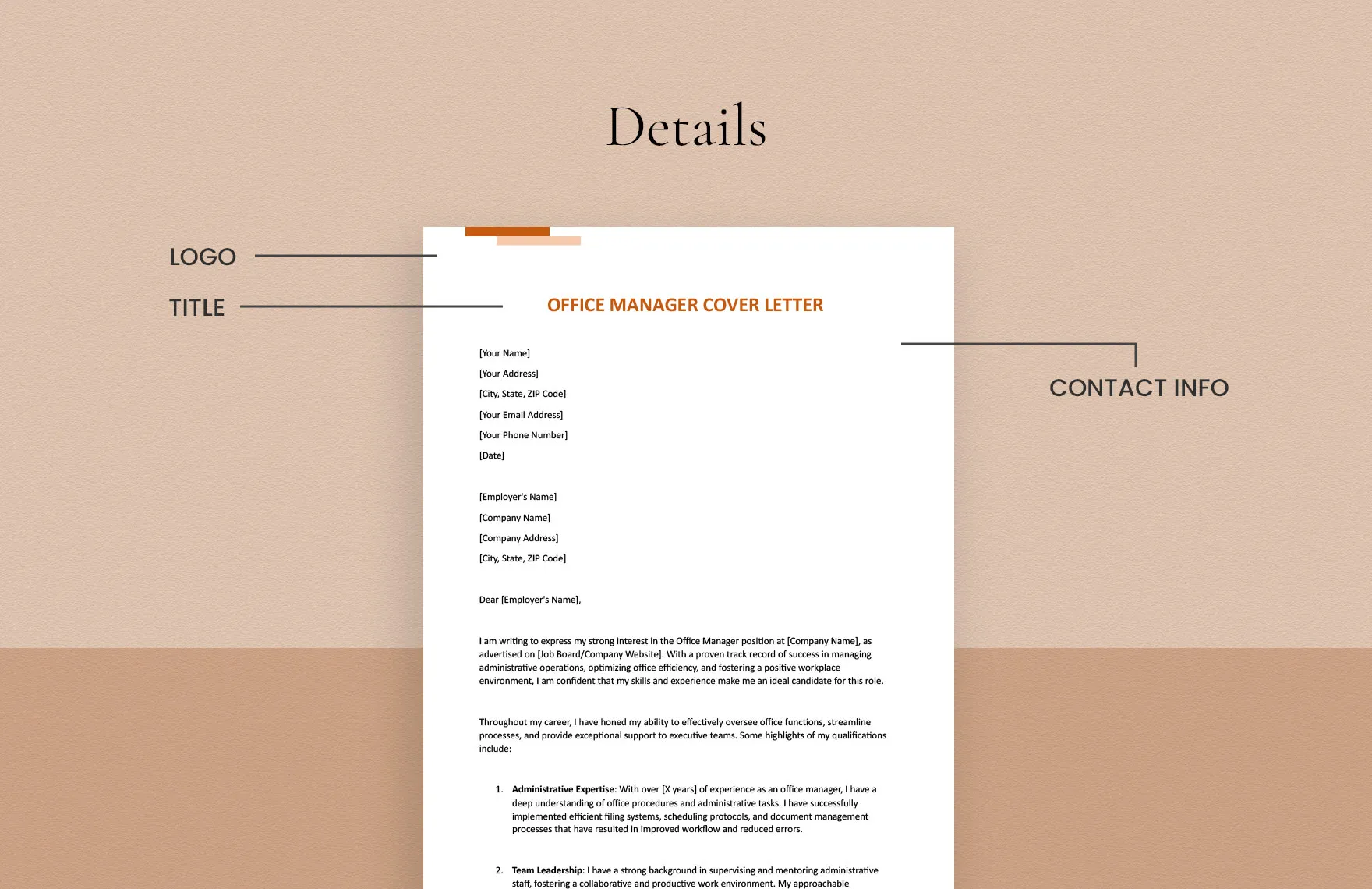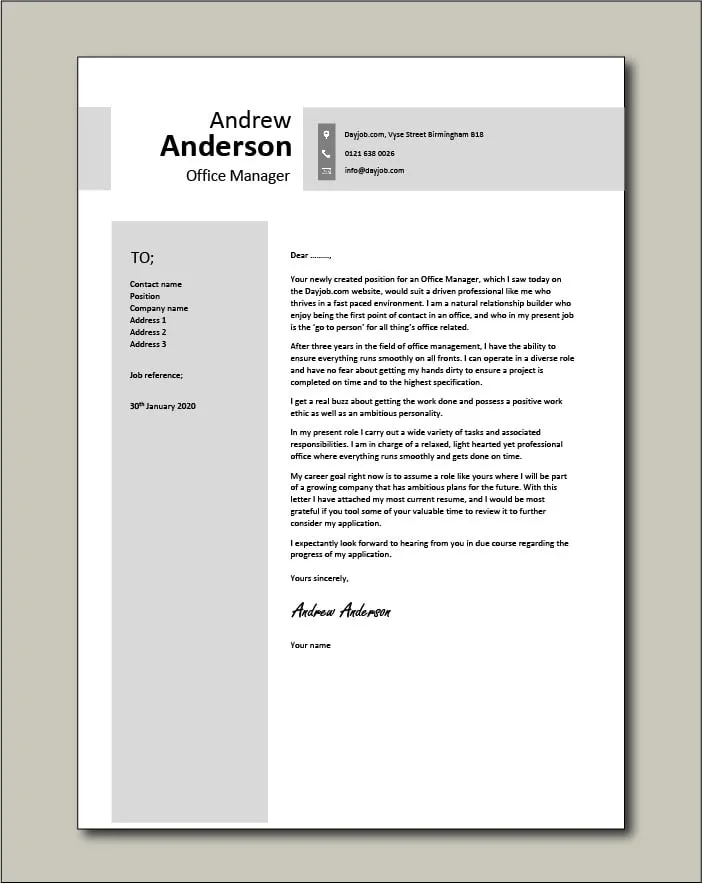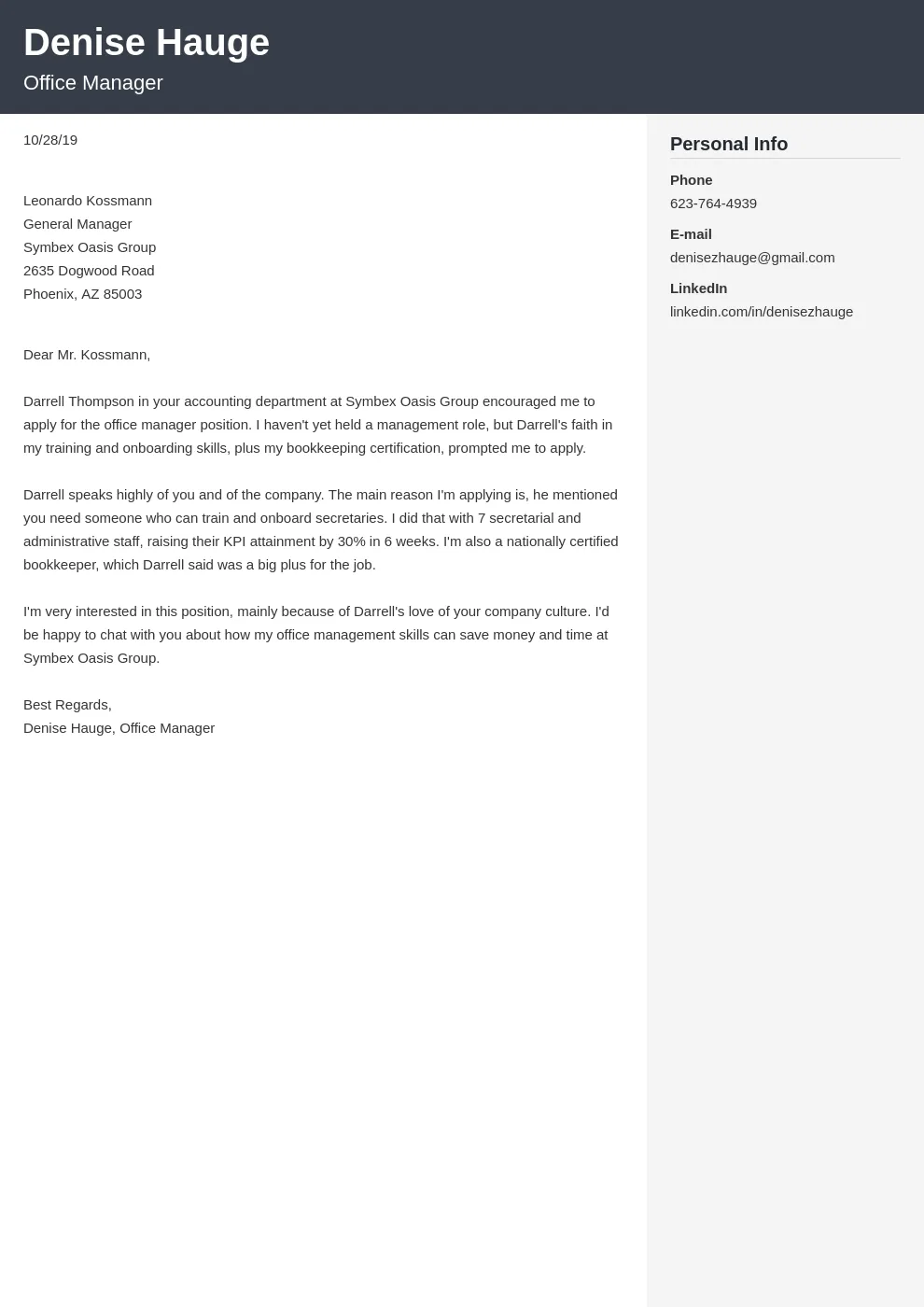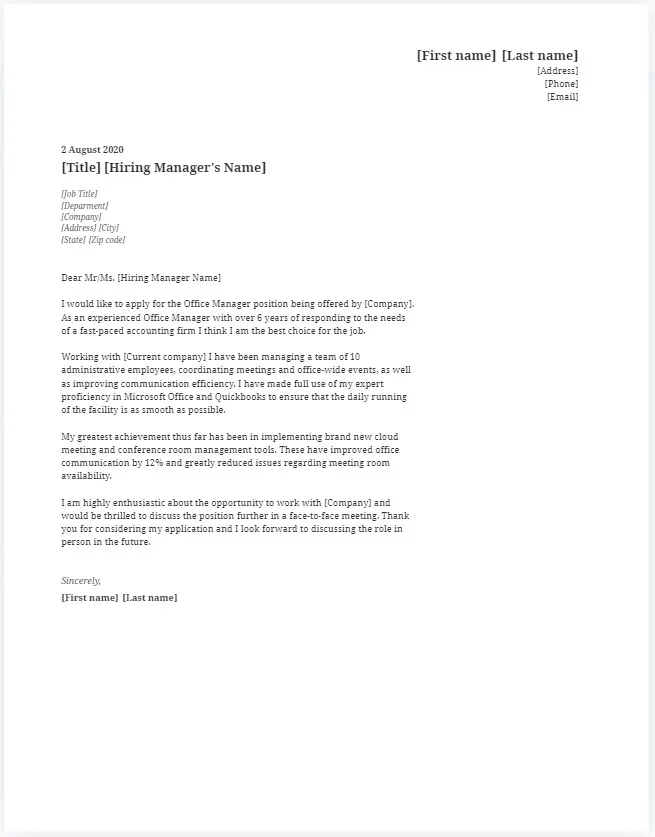Understanding the Office Manager Role
An office manager is a crucial role within any organization, serving as the linchpin that holds everything together. They are responsible for a wide array of tasks, including but not limited to managing office supplies, coordinating administrative staff, overseeing facility maintenance, and ensuring smooth daily operations. To create a compelling cover letter, it’s essential to have a clear understanding of the position’s multifaceted nature. A strong cover letter should demonstrate your ability to handle these diverse responsibilities effectively. Highlighting your organizational skills, attention to detail, and ability to multitask is key. A well-crafted cover letter will show employers that you possess the qualities necessary to excel in this critical position. Your goal is to paint a picture of your suitability for the role, demonstrating how your experience and skills align with the company’s needs.
Key Skills for Office Manager Cover Letters
Office manager roles require a unique blend of soft and hard skills. In your cover letter, emphasize the skills most relevant to the position. Communication skills are paramount, including written and verbal communication. Highlight your ability to interact with colleagues, vendors, and clients professionally. Organizational skills are another vital aspect, encompassing the ability to manage multiple tasks simultaneously, prioritize effectively, and maintain a well-organized workspace. Proficiency in administrative tasks, such as scheduling, managing correspondence, and record-keeping, is essential. Furthermore, proficiency in relevant software, such as Microsoft Office Suite (Word, Excel, PowerPoint, and Outlook), is typically expected. Any experience with project management, customer service, and basic accounting can significantly enhance your application. Tailoring your cover letter to showcase these skills will significantly improve your chances of landing an interview.
Highlighting Experience in Your Cover Letter

Your experience section should be the highlight of your cover letter. Begin by outlining your past roles, making sure to use action verbs to describe your responsibilities. Instead of just listing tasks, focus on the impact of your actions and the results you achieved. Quantify your accomplishments whenever possible. For instance, rather than saying ‘Managed office supplies,’ you could write, ‘Managed a $10,000 annual office supply budget, reducing spending by 15% through strategic vendor negotiations.’ If you have experience in training staff, mention the number of employees trained and any positive outcomes. If you’ve streamlined office processes, detail how this improved efficiency or reduced costs. Show, don’t just tell, employers about your abilities. This will make your experience more compelling and demonstrate your value. Focus on the relevance of your experiences to the specific office manager role you are applying for.
Formatting Your Office Manager Cover Letter for Success
The formatting of your cover letter should be professional and easy to read. Choose a standard font like Times New Roman, Arial, or Calibri, and use a font size between 10 and 12 points. Maintain consistent spacing throughout the document, and ensure there are clear margins. Use bullet points or numbered lists to highlight key achievements and skills; this helps the hiring manager quickly scan and understand your qualifications. Always include your contact information at the top of the letter, including your name, phone number, email address, and LinkedIn profile (if you have one). Address the hiring manager by name if possible; researching the hiring manager’s name and title on LinkedIn or the company website shows that you’ve taken the time to learn about the company. Keep the letter concise—aim for one page. A well-formatted cover letter demonstrates your attention to detail and professionalism, making a positive impression on the employer.
Crafting a Compelling Opening for Your Cover Letter
The opening of your cover letter is critical; it’s your first chance to make a positive impression. Avoid generic phrases like ‘I am writing to apply for the office manager position.’ Instead, start with a strong statement that captures the reader’s attention and shows your enthusiasm for the role. Briefly mention where you found the job posting and why you are interested in the company. Show you understand the company’s mission or values, and explain how your skills align with the company’s needs. If you were referred by someone, mention their name. Your goal is to immediately grab the hiring manager’s interest. The opening paragraph should set the tone for the rest of your letter. Highlighting a key skill or achievement relevant to the job can immediately demonstrate your value. Remember to tailor the opening to each specific job application; this shows that you have taken the time to understand the company’s needs and are genuinely interested in the position.
Showcasing Relevant Achievements and Quantifiable Results

To make your cover letter stand out, focus on showcasing your achievements and quantifying your results. Use the STAR method (Situation, Task, Action, Result) to provide specific examples of your accomplishments. Begin by describing the situation you were in, then outline the task you were assigned. Explain the actions you took to address the task, and finally, highlight the positive results you achieved. Always quantify your accomplishments whenever possible. For instance, did you improve office efficiency by a certain percentage? Did you reduce costs, increase productivity, or enhance employee satisfaction? Providing data makes your achievements more compelling and demonstrates your ability to deliver measurable value. Your goal is to demonstrate your ability to solve problems, improve processes, and achieve positive outcomes. Doing so shows that you’re not just capable, but also a results-driven professional.
Addressing the Hiring Manager’s Needs
Researching the company and the specific job description is essential. Understanding the hiring manager’s needs allows you to tailor your cover letter effectively. Analyze the job description carefully, and identify the key skills and qualifications the employer is seeking. In your cover letter, explicitly address these requirements, providing examples of how your experience and skills align with the job’s demands. Highlight your ability to handle specific challenges and contribute to the company’s success. Show that you understand the company’s values, mission, and goals. Personalize your cover letter to demonstrate that you have taken the time to learn about the company and are genuinely interested in the position. By directly addressing the hiring manager’s needs, you increase your chances of getting an interview. A targeted approach shows the hiring manager that you’re not just sending out generic applications; you’re specifically interested in their company and its needs.
Writing a Strong Closing to Secure an Interview
The closing paragraph is your final opportunity to make a lasting impression. Reiterate your interest in the position and your enthusiasm for the company. Express your confidence in your ability to contribute to their success. Include a call to action, such as, ‘I am eager to discuss how my skills and experience can benefit your company. I am available for an interview at your earliest convenience.’ Thank the hiring manager for their time and consideration. Proofread the entire cover letter carefully before submitting it. A well-written closing reinforces your qualifications and motivates the hiring manager to take the next step. Avoid generic closing phrases. Instead, aim for a professional, confident, and specific closing that leaves a positive impression. Remember to include your contact information again to make it easy for the hiring manager to reach you.
Common Mistakes to Avoid in Office Manager Cover Letters

Several common mistakes can undermine your cover letter. Avoid generic templates; tailor each letter to the specific job and company. Do not include irrelevant information; focus on skills and experiences relevant to the office manager role. Proofread your cover letter carefully for grammatical errors, typos, and formatting inconsistencies. Avoid using jargon or overly complex language. Keep the tone professional and concise. Do not simply restate your resume; provide additional details and context. Avoid negative language; focus on your strengths and accomplishments. Failing to address the hiring manager by name shows a lack of attention to detail. Avoid sending the same cover letter for every job. Tailor each application to the specific requirements of each position. Be sure to review your letter for any information that contradicts the job description, such as the wrong job title or company name.
Cover Letter Templates and Examples
Using cover letter templates can save time and provide a starting point, but it’s crucial to personalize them to reflect your skills and experience. Numerous online resources offer cover letter templates specifically tailored for office manager positions. These templates provide a basic structure, including sections for your contact information, a greeting, an opening paragraph, skills and experience sections, and a closing. When using a template, adapt it to fit your specific qualifications and the requirements of the job. Don’t just copy and paste the template content; instead, replace the generic phrases with your own unique experiences and achievements. Review the examples provided to gain an understanding of what a strong cover letter looks like. Always customize your cover letter. By personalizing the template, you demonstrate that you’ve taken the time to understand the job requirements and showcase your unique value to the company. Ensure that the template aligns with the job posting and highlights your most relevant skills and experiences.
